Vintage Treasures: What If?, Volumes 1-3, edited by Richard A. Lupoff
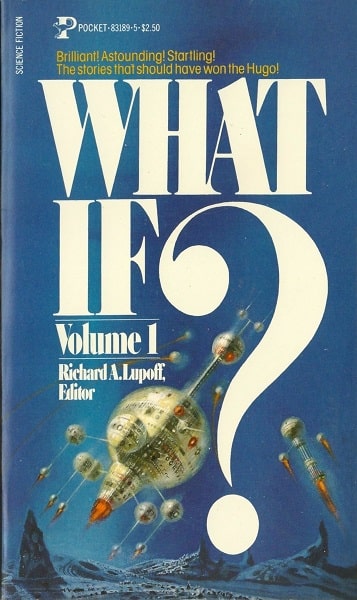 |
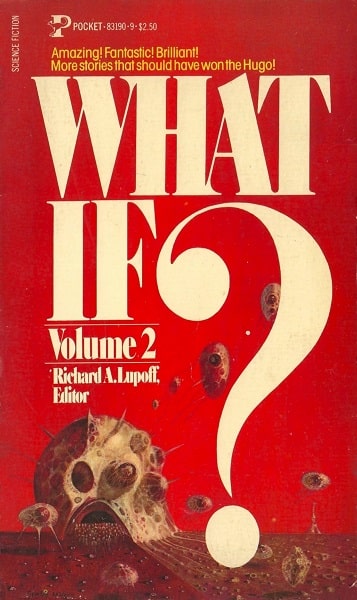 |
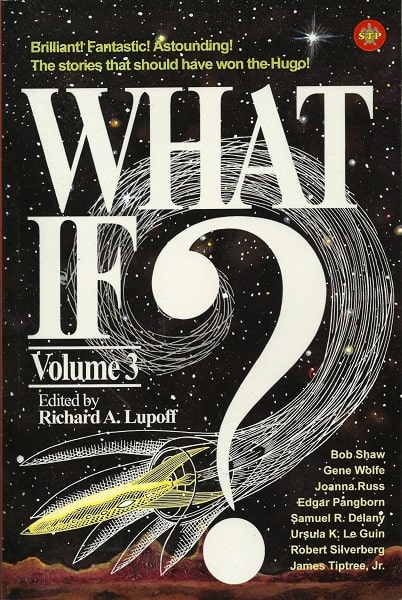 |
What If, Volumes 1-2 (Pocket Books, 1980 and 1981) and Volume 3
(Surinam Turtle Press, 2013). Covers by Richard Powers and Gavin L. O’Keefe
Richard Lupoff was a True Believer. By which I mean he gave his career to science fiction, and both cared about it deeply and wrote about it fairly extensively — like Isaac Asimov, Brian Aldiss, Harry Harrison, Terry Carr, Sam Moskowitz, Donald A. Wollheim, Barry N. Malzberg, Gardner Dozois, and a handful of other crusty old timers.
The thing about True Believers is they have opinions. Boy, do they. They’re happy to tell you when the Golden Age of Science Fiction actually was, what they think of modern SF, and what should have won the Hugo Award last year. And the year before that. They’re especially vocal about awards, come to think of it.
Lupoff didn’t just spout off about stories that were unjustly robbed of a Hugo Award — he actually did something about it. In 1980 and ’81 he published two highly-regarded anthologies, What If? Volume One and Volume Two, which brazenly set out to “Remedy the Injustices of the Past Three Decades!” (that’s right there on the back cover copy) and collect the fiction that SHOULD have won the Hugo Award every year, starting with 1953 and working all the way up to 1965. In 2013, Surinam Turtle Press released the long-delayed third volume, presenting Lupoff’s selections for the fiction that should have been awarded SF’s highest honor in 1966-1973.
[Click the images to see versions that were robbed of a Hugo Award.]
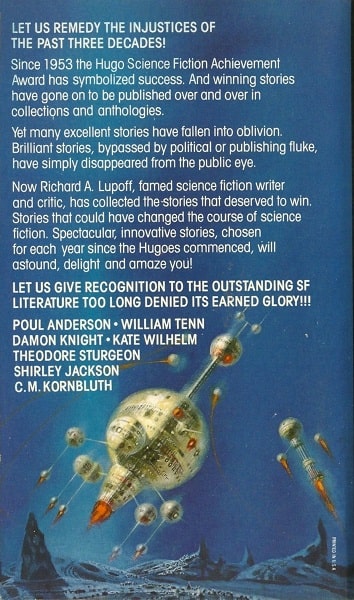 |
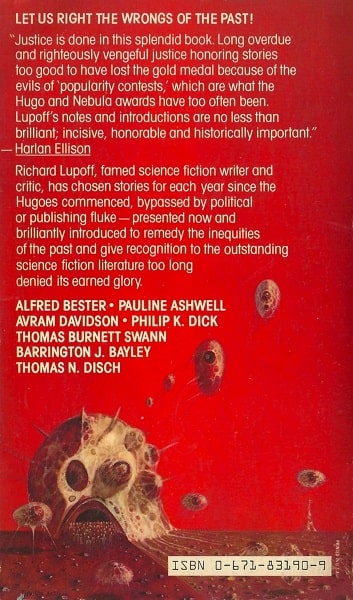 |
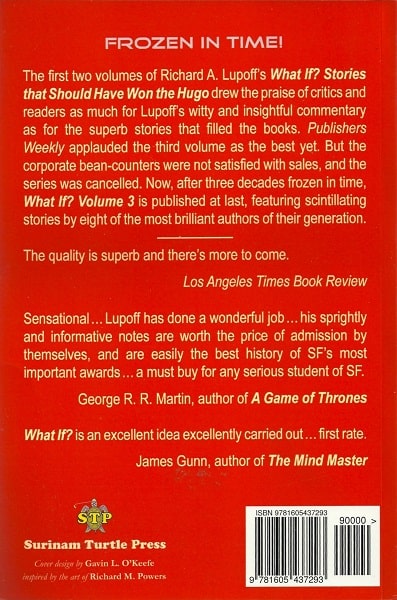 |
Back covers to What If, Volumes 1-3
These anthologies are a lot of fun. For one thing, Lupoff has excellent taste. There aren’t a lot of editors whom I’d trust to second-guess the Hugo electorate (which I believe by and large did an excellent job, especially in the era we’re discussing here), but with his selections and commentary Lupoff makes a very compelling case for many of these stories.
His selections include many stories that are considered modern classics, and no small number of terrific tales that are still overlooked today, including:
“The Golden Helix” by Theodore Sturgeon (1954)
“One Ordinary Day, with Peanuts” by Shirley Jackson (1955)
“The Mile-Long Spaceship” by Kate Wilhelm (1957)
“Where Is the Bird of Fire?” by Thomas Burnett Swann (1962)
“Light of Other Days” by Bob Shaw (1966)
“The Star-Pit” by Samuel R. Delany (1967)
“The Island of Doctor Death and Other Stories” by Gene Wolfe (1970)
And one of my favorite Ursula K. Le Guin tales,
“Vaster Than Empires and More Slow” (1971)
Lupoff also showcases a couple of surprises. (Does anyone remember Pauline Ashwell? Anyone other than Rich Horton, I mean.)
One of the most delightful aspects of these books is Lupoff’s lengthy essays. He had a fan’s love of the Hugo awards, coupled with an insider’s knowledge and a keen eye for a changing industry. Here he is on the Best Novel nominees of 1962.
The nominated novels were A Fall of Moondust by Arthur C. Clarke, Little Fuzzy by H. Beam Piper, The Man in the High Castle by Philip K. Dick, and Sylva by Vercors (Jean Bruller). It’s interesting to note that not one of the nominees was a magazine story. The magazines did serialize some novels, and some pretty good ones. Analog ran Anything You Can Do by Darrel T. Langart (Randall Garrett), Border, Breed, Nor Birth by Mack Reynolds, A Life for the Stars by James Blish. and Space Viking by H. Beam Piper — an amazing performance for a single year.
Amazing Stories serialized one old-style potboiler, Pawn of the Black Fleet by Mark Clifton, and one more significant novel, A Trace of Memory by Keith Laumer.
Galaxy ran only one serial in 1962, but it was a good one — Frederik Pohl’s A Plague of Pythons. And If presented the voters with a pair of puzzles: two serials that split the years. Masters of Space by E.E. Smith and E.E. Evans started in 1961 and ended in ’62; Podkayne of Mars by Heinlein started in 1962 and carried over to ’63. And the last of the “majors,” F&SF, had The Journey of Joenes by Robert Sheckley… In 1962, New Worlds ran serials by James White, John Rackham, Brian Aldiss, and Keith Woodcott [John Brunner].
All to no avail. The readers were thoroughly hooked on books now — or so it seemed. In later years, a number of successful novels had both magazine and book editions. But the day when a novel could triumph on the basis of magazine serialization alone was over.
The winner for 1962 was The Man in the High Castle, and it won on the basis of its original (Putnam) and book club (Science Fiction Book Club) editions. There wasn’t even a paperback until 1964!
I have a decent library of old SF, and I find I appreciate the way Lupoff ignites my interest in old science fiction again. I haven’t thought of A Plague of Pythons or Space Viking in years, but he makes me want to dig up my old copies. And he certainly makes me want to track down a copy of Sylva and Border, Breed, Nor Birth. His love of SF is infectious, and he sure knows how to make it interesting.
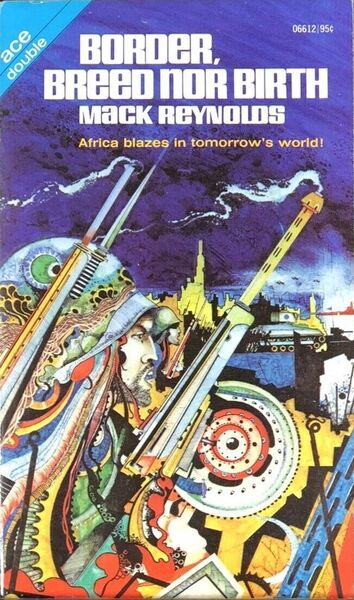 |
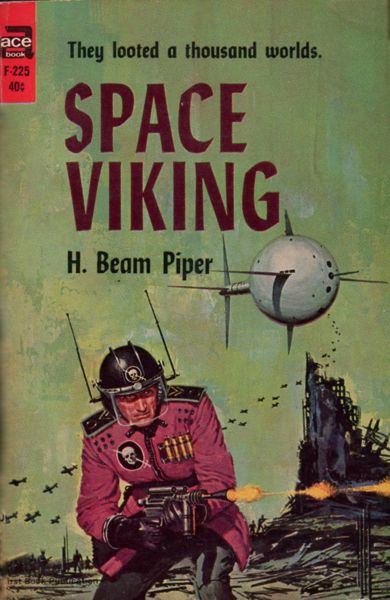 |
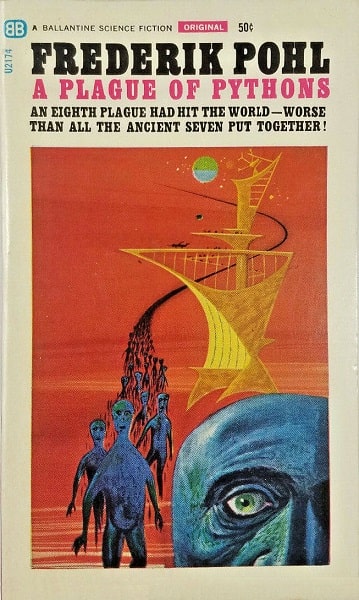 |
Paperback versions of the magazine serials: Border, Breed, Nor Birth by Mack Reynolds,
half of an Ace Double with Blackman’s Burden (Ace Books, 1972); Space Viking by H. Beam Piper
(Ace, 1963), and A Plague of Pythons (Ballantine, 1965). Covers by Ian Miller, unknown, and Ralph Brillhart
Even if you have copies of most of these stories, these books are worth reading for Lupoff’s commentary alone. Not merely his introductions, but his year-by-year comments and reminiscences on the Hugos (and the conventions, and the Hugo ceremonies themselves). The stories are interspersed with these short 3-5 page essays, which add an enormous amount of color to the books.
Here’s the complete TOC for What If? Volume One, which contained novellas by William Tenn, Theodore Sturgeon, and C. M. Kornbluth. None of the stories he selects for this anthology were nominated for a Hugo, or indeed for any major award at all.
Earned Glory, by Richard A. Lupoff
1952 — essay by Lupoff
“Firewater!” by William Tenn (Astounding Science Fiction, February 1952)
1953 — essay by Lupoff
“Four in One” by Damon Knight (Galaxy Science Fiction, February 1953)
1954 — essay by Lupoff
“The Golden Helix” by Theodore Sturgeon (Thrilling Wonder Stories, Summer 1954)
1955 — essay by Lupoff
“One Ordinary Day, with Peanuts” by Shirley Jackson (The Magazine of Fantasy and Science Fiction, January 1955)
1956 — essay by Lupoff
“The Man Who Came Early” by Poul Anderson (The Magazine of Fantasy and Science Fiction, June 1956)
1957 — essay by Lupoff
“The Mile-Long Spaceship” by Kate Wilhelm (Astounding Science Fiction, April 1957)
1958 — essay by Lupoff
“Two Dooms” by C. M. Kornbluth (A Mile Beyond the Moon, 1958)
And here’s the TOC for What If? Volume Two, including novellas by Pauline Ashwell and Thomas Burnett Swann. This one included three Hugo nominees, including both novellas.
My Aunt Cora, by Richard A. Lupoff
1959
“The Pi Man” by Alfred Bester (The Magazine of Fantasy and Science Fiction, October 1959) — Hugo nominee
1960
“The Lost Kafoozalum” by Pauline Ashwell (Analog Science Fact & Fiction, October 1960) — Hugo nominee
1961
“The Sources of the Nile” by Avram Davidson (The Magazine of Fantasy and Science Fiction, January 1961)
1962
“Where Is the Bird of Fire?” by Thomas Burnett Swann (Science Fantasy, April 1962) — Hugo nominee
1963
“Stand-By” by Philip K. Dick (Amazing Stories, October 1963)
1964
“Now Is Forever” by Thomas M. Disch (Amazing Stories, March 1964)
1965
“All the King’s Men” by Barrington J. Bayley (New Worlds SF #148 March 1965)
Lupoff produced these books for David Hartwell at Pocket Books (another True Believer). Fascinatingly, George R.R. Martin had the same idea. but bowed out when Lupoff got there first. I’d be very interested in learning what Martin’s versions of these books would have looked like.
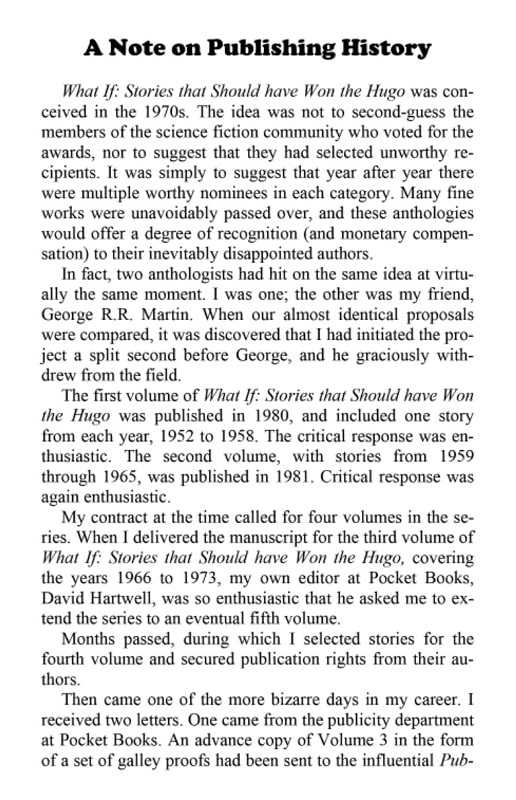 |
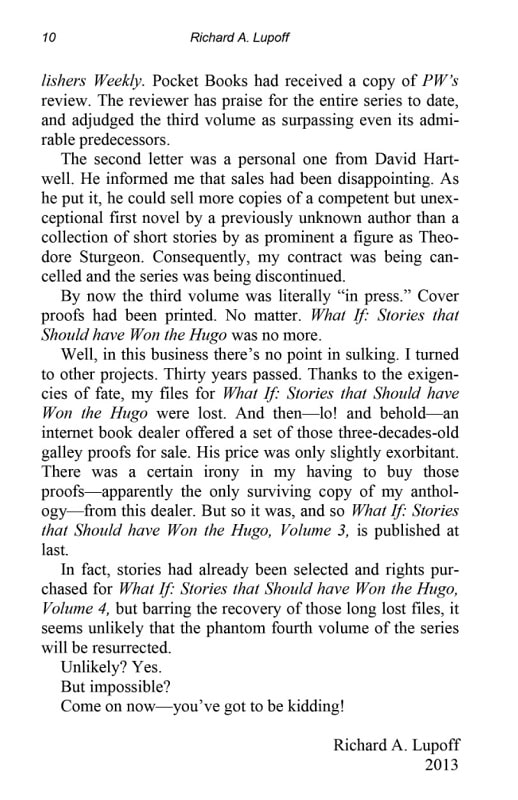 |
Lupoff’s publishing note to Volume Three, on the 30-year hiatus between volumes.
There were originally intended to be five volumes in the series, but it was canceled after only two due to low sales. A single galley copy of the third volume survived, and Lupoff was able to obtain it from a dealer, and it was finally published some 30 years later by Surinam Turtle Press (see above). For the record, I’m extremely grateful to the folks at Surinam Turtle Press for bringing this one into print at last.
Lupoff passed away in 2020, so we won’t have any more volumes of What If? I think that’s a shame.
The third book is a delight, however. It contains a Slow Glass story by Bob Shaw, an Alyx novelette by Joanna Russ, a brilliant Hainish story by Ursula K. Le Guin, a Nebula nominee by Gene Wolfe, and classic novellas by Samuel R. Delany and Edgar Pangborn. Here’s the complete TOC.
A Note on Publishing History, by Richard A. Lupoff
Shining Examples: An Introduction, by Richard A. Lupoff
“Light of Other Days” by Bob Shaw (Analog Science Fiction & Science Fact, August 1966) — Hugo nominee, Nebula nominee
“The Star-Pit” by Samuel R. Delany (Worlds of Tomorrow, February 1967) — Hugo nominee
“The Barbarian” by Joanna Russ (Orbit 3, 1968)
“Sundance” by Robert Silverberg (The Magazine of Fantasy and Science Fiction, June 1969)
“The Island of Doctor Death and Other Stories” by Gene Wolfe (Orbit 7, 1970) — Nebula nominee
“Vaster Than Empires and More Slow” by Ursula K. Le Guin (New Dimensions 1, 1971) — Hugo nominee
“Painwise” by James Tiptree, Jr. (The Magazine of Fantasy and Science Fiction, February 1972) — Hugo nominee
“My Brother Leopold” by Edgar Pangborn (An Exaltation of Stars, 1973)
Here’s the complete publishing details.
What If? Volume 1 (Pocket Books, 266 pages, $2.50 in paperback, September 1980) — cover by Richard Powers
What If? Volume 2 (Pocket Books, 239 pages, $2.50 in paperback, February 1981) — cover by Richard Powers
What If? Volume 3 (Surinam Turtle Press, 308 pages, $35 hardcover/$20 trade paperback, October 18, 2013) — cover by Gavin L. O’Keefe
The third volume is still in print. There are no digital editions.
See all of our recent Vintage Treasures here.
You have a typo: Richard Lupoff passed away in 2020, not 1990.
Mark,
You are entirely correct. Thanks for the correction!
I read “Plague of Python’s” a few years ago. A good book, but pretty f’d up!
I haven’t tried it. But if Lupoff says it’s good, I’m willing to give it a shot!
I think that I would be partial to most, if not all, of Mr. Lupoff’s arguments for “alternate” Hugos, as my brain is desperately trying to convince me that “Light of Other Days” was a story we read in the Asimov Hugo Winners omnibus. I keep telling it that it must be thinking of “Slow Sculpture” by Theodore Sturgeon and confusing it with “slow glass”, but it just will not listen! Stupid brain.
LOL. I’ve gone back to THE HUGO WINNERS, VOLUMES ONE AND TWO a couple times, convinced I read a story in there that turned out to be in another anthology. I think stupid brain comes with age.
One thing I haven’t done is sit down with Lupoff’s selections and compare them to the actual winners. I wonder which I’d agree with more.
Excellent post, Mr. O’Neill. I’ve been a fan of Lupoff’s work since I read his biography of Edgar Rice Burroughs and I found his note on Publishing History fascinating. Thank you!
John,
I didn’t even know Lupoff’s book Edgar Rice Burroughs : Master of Adventure existed until you just mentioned it, and I looked it up on Amazon. It is as good as it looks??
I read this when it first came out circa late 60s/early 70s. Back in the day I read everything I could of Burroughs and felt he was the greatest writer in the world. Lupoff was the first writer that (gently) bust the bubble on that conception. His book is a love letter to the works of Burroughs and an great introduction to the reader NOT famialr with all the characters he created. Told with respect, insight, and admiration. An overview if you will and well worth the read. (He also put a pin in my bubble over the Bomba the Jungle Boy series. Siigh). 🙂
Richard,
That’s a very fine min-review. Now I’ll have to track down a copy!
I’m familiar with Lupoff’s non-fiction on comics (All in Color for a Dime), but hadn’t realized just how much fine non-fiction he left behind. More collecting to do….
It has been decades since I read that book, but I remember being fascinated by such a detailed look behind the scenes of so many of the books I enjoyed. I liked Lupoff’s style of writing and he did his research. I think you might enjoy it.
Thanks John. I think you’re right, and I’m on the hunt for a copy.
Lupoff was an expert not just on SF, but on comics, on pulps, on mysteries. And he rediscovered an early bit of proto-SF, Edwin L. Arnold’s Lieut. Gullivar Jones: His Vacation. He arranged for Ace to republish it. It was first published in 1905, and quite clearly prefigures Burroughs’ Barsoom novels. (Gullivar Jones’ vacation is to Mars.) I wrote about that here: http://rrhorton.blogspot.com/2018/01/old-bestseller-lieut-gullivar-jones-his.html
Lupoff wrote in a wide variety of fields, always entertainingly. We corresponded briefly some time ago. Here’s what I wrote about one of his collections (plus some more short fiction): http://rrhorton.blogspot.com/2020/02/birthday-review-claremont-tales-ii-plus.html
That’s a fine review of Claremont Tales II Rich. Though I must admit that, after reading that article, the story I’m most anxious to track down is Lupoff’s “Fourth Avenue Interlude,” from the August-September Weird Tales.
Rich wrote:
“My favorite from Weird Tales for August-September, however, is a moving semi-autobiographical story by Richard Lupoff, “Fourth Avenue Interlude”, about a boy in love with books who helps out in an old New York City bookstore, and the wonderful discovery he makes – but the wonderful discovery isn’t the point: or only to the extent that what he really discovers is the pleasures of all sorts of stories.”
I associate Lupoff with Circumpolar! I have vague memories of an entertaining yarn along the lines of Rocketeer. VERY vague memories…..
Aonghus,
I’ve never read Circumpolar!, though I remember seeing it on bookshelves. Maybe that’s an error I should rectify.
Here – by way of contrast – is the Granada cover –
https://www.parigibooks.com/pages/books/16406/richard-a-lupoff/circumpolar
John, this is a great piece on books by Lupoff that I love, although I have not read them. The short fiction selections overlap nicely with the Jo Walton et al alternate Hugo thoughts on her Tor com blog posts and her book “The Informal History of the Hugo’s…”, and by those of Rich Horton at Strange at Ecabatan http://rrhorton.blogspot.com/2022/08/alternate-hugo-nominations-of-1950s.html?m=1. Like you, I Iove Lupoff’s extensive essays on what should have been nominated and should have won. Are you aware that Mike Ashley published Lupoff Lists for short fiction in “The Illustrated Book of Science Fiction Lists”, extending them from 1926 to 1978? See summary at Mark R. Kelly’s SFADB, https://www.sfadb.com/LupoffWhatIf. Of course, the lists before and after What If 1, 2 and 3 are only lists, but still fun. I especially love his choices from before any major SF awards existed.
Thanks, Dave, especially for pointing me to Lupoff’s extended lists! I didn’t know about those!
Dave,
I had no idea Lupoff’s lists had survived anywhere! Thanks a ton for sharing that.
Here are the stories that Lupoff intended to be in future volumes, according to Mike Ashley’s The Illustrated Book of Science Fiction Lists, as reported by Mark Kelly at The Science Fiction Awards Database.
Harry Bates – “Farewell to the Master” (Astounding Oct 1940)
Eando Binder – “Via Jupiter” (Thrilling Wonder Stories Feb 1942)
James Blish – “Bindlestiff” (Astounding Dec 1950)
Anthony Boucher – “The Chronokinesis of Jonathan Hull” (Astounding Jun 1946)
Ray Bradbury – “The Third Expedition” (Planet Stories Fll 1948)
Fredric Brown – “And the Gods Laughed” (Planet Stories Spr 1944)
Edgar Rice Burroughs – “The Resurrection of Jimber-Jaw” (Argosy Feb 20 1937)
Arthur C. Clarke – “The Fires Within” (Fantasy, The Magazine of Science Fiction Aug 1947)
Stanton A. Coblentz – “Exiles from the Universe” (Amazing Feb 1938)
Richard Cowper – “Piper at the Gates of Dawn” (F&SF Mar 1976)
H. L. Gold – “None but Lucifer”
Edmond Hamilton – “Evolution Island” (Weird Tales Mar 1927)
Clare Winger Harris – “The Miracle of the Lily” (Amazing Apr 1928)
Robert A. Heinlein – “Gulf” (Astounding Nov 1949)
A. R. Hilliard – “The Space Coffin”
David H. Keller – “The Literary Corkscrew” (Wonder Stories Mar 1934)
Frank K. Kelly – “Star Ship Invincible” (Astounding Jan 1935)
Donald E. Keyhoe – “Through the Vortex” (Weird Tales Jul 1926)
Murray Leinster – “First Contact” (Astounding May 1945)
Frank Belknap Long – “A Visitor from Egypt” (Weird Tales Sep 1930)
H. P. Lovecraft – “The Dunwich Horror” (Weird Tales Apr 1929)
John D. MacDonald – “Common Denominator” (Galaxy Jul 1951)
Vonda N. McIntyre – “Aztecs” (2076: The American Tricentennial, 1977)
Michael Moorcock – “Pale Roses” (New Worlds 7, 1974)
C. L. Moore – “Shambleau” (Weird Tales Nov 1933)
Seabury Quinn – “A Rival from the Grave” (Weird Tales Jan 1936)
Edward E. Smith – “The Vortex Blaster” (Comet Jul 1941)
John Varley – “Retrograde Summer” (F&SF Feb 1975)
Ian Watson – “The Very Slow Time Machine” (Anticipations, 1978)
Manly Wade Wellman – “Frontier Planet” (Thrilling Wonder Stories Feb 1943)
Jack Williamson – “Through the Purple Cloud” (Wonder Stories May 1931)
Both “Blind Man’s Lantern” by Allen Kim Lang(Dec ’62 “Analog”) and “Teratohippus”by Robert L Davis(Dec ’72 “If”) should have won Hugo’s for the short form in their respective years. Also(not sure if it did or not) “Brightside Crossing “by Allen E Nourse in 1956 should’ve…
I was born in 1949 and have been a HUGE!!!! science fiction fan especially due to Sir Arthur C Clarke’s stories and (still the best of Anything! ever put on television) Rod Serling’s “The Twilight Zone”.
Hey Twilight,
“Brightside Crossing” was nominated for a Hugo Award for Best Novelette in 1956, but lost out to Murray Leinster’s “Exploration Team.”
I don’t encounter too many other Twilight Zone fans these days. Only a handful of true believers left, I fear!